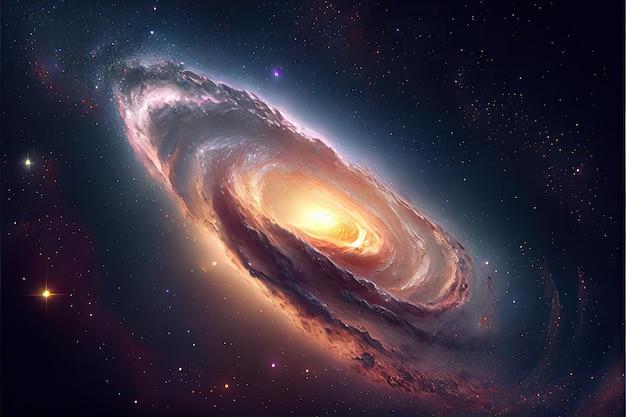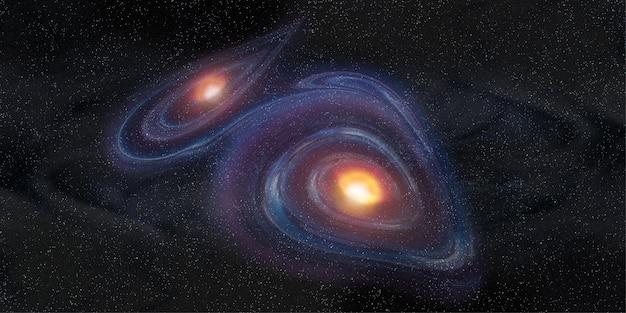Imagine a scenario where two gigantic galaxies, the Milky Way and Andromeda, are hurtling towards each other at an astonishing speed. It might sound like the plot of a science fiction movie, but it’s a real event that is bound to happen in the distant future. Scientists predict that in about 4 billion years, our beloved Milky Way will collide with its closest neighbor, Andromeda, in a cosmic dance that will reshape our universe as we know it.
As we gaze up at the night sky, it’s natural to wonder what this collision means for us, the inhabitants of Earth. Will our planet be destroyed? Will we be able to survive? In this blog post, we’ll explore the fascinating phenomenon of the Milky Way-Andromeda collision, uncovering its implications for humanity and shedding light on the mysteries of our vast universe. So buckle up, fellow space enthusiasts, as we embark on an intergalactic journey to uncover the secrets of our cosmic destiny.
Will We Die When Andromeda Collides
There’s No Need to Panic, We Won’t Become Cosmic Dust Just Yet
Are you lying awake at night, restless and tormented by thoughts of our distant cosmic neighbor, the Andromeda galaxy, hurtling towards us at breakneck speed? I hate to break it to you, but you can finally get some well-deserved shut-eye, because the truth is, we won’t be meeting our celestial end anytime soon. Here’s why.
A Slow-Motion Dance of Cosmic Giants
While it’s true that the Andromeda galaxy is on a collision course with our very own Milky Way, it’s not something you need to add to your doomsday calendar just yet. The estimated timeframe for this epic tango is around 4 billion years from now. Yes, billion with a “B.” So, unless you’ve found the holy grail of anti-aging treatments, chances are you won’t be around to witness this cosmic spectacle.
The Universe Has Seen It All Before
Believe it or not, galactic collisions are actually quite common in the vast expanse of the cosmos. In fact, astronomers have observed countless cosmic collisions throughout history, and life has managed to survive and thrive through it all. So while Andromeda’s impending arrival may sound like a catastrophic event, rest assured that our universe is well-equipped to handle it.
A Stellar Merger of Epic Proportions
When Andromeda and the Milky Way finally collide, it won’t be a violent smash-up like in some sci-fi blockbuster. Instead, picture a mesmerizing cosmic ballet, where gravity gently pulls the galaxies together with an irresistible force. Over millions of years, they will merge and morph into a new supergalactic entity, redefining the boundaries of what we know as our home in the universe.
Earth, Hold on Tight!
Now, let’s address the big question on everyone’s mind: What does all of this mean for us Earthlings? Well, luckily for us, the vast majority of galaxies are mostly empty space. So, even though the stars in our galaxies will come closer together during the collision, the chances of two star systems physically colliding are extremely low. Phew!
A Front Row Seat to a Celestial Spectacle
When the time comes for Andromeda to make its grand entrance into our neighborhood, don’t fret about abandoning your bucket list or relocating to Mars. The collision will unfold over such a long period of time that it will be more like a slow celestial waltz than a sudden calamity. So, sit back, relax, and enjoy the show. We’re about to witness one of the most extraordinary events in the history of the universe!
The Cosmic Circle of Life Continues
In the grand scheme of things, the collision of Andromeda and the Milky Way is just another chapter in the ever-evolving cosmic tale. As galaxies collide, stars are born, and new solar systems take shape. So, instead of mourning the loss of our familiar night sky, let’s embrace the wonders that lie ahead and be grateful for the opportunity to witness the cosmic circle of life in action.
Keep calm, fellow Earthlings—we still have a few billion years to go before Andromeda comes knocking at our door. Until then, let’s revel in the marvels of our own galaxy and continue to explore the countless mysteries of the universe. Safe travels!
FAQ: Will We Die When Andromeda Collides
Introduction
In a universe filled with countless mysteries, the collision between our very own Milky Way and the neighboring Andromeda galaxy has sparked curiosity and raised important questions. Will this cosmic event spell doom for us? Fear not, dear reader, for we have compiled a comprehensive FAQ-style guide to shed light on the impending collision and its potential impact on our existence.
FAQ Subsection
How Old Is Our Galaxy
Ah, the age-old question! Our beloved Milky Way has been gracefully twirling through space for a staggering 13.6 billion years. It’s quite the cosmic senior citizen, don’t you think?
What Is the Largest Galaxy in the Universe
Ladies and gentlemen, brace yourselves for the titanic grandeur of IC 1101! This colossal galaxy takes the crown as the largest known galaxy in the observable universe. With a diameter reaching about 5.5 million light-years, it dwarfs our humble Milky Way.
How Fast Is the Milky Way Moving Towards Andromeda
Hold on tight, folks, because the Milky Way is zooming through space at a breakneck speed of 250,000 miles per hour! That’s roughly 402,336 kilometers per hour for our metric-savvy friends. Talk about a cosmic need for speed.
Can We See Andromeda from Earth
Why, of course! On a clear night, if you cast your gaze to the heavens, you might just catch a glimpse of the majestic Andromeda galaxy. Located a mere 2.537 million light-years away, it’s practically our next-door neighbor in astronomical terms.
What Is Older Than the Universe
Prepare to have your mind boggled. The concept of time itself becomes a bit wonky when pondering what could possibly be older than the universe. Perhaps the only suitable answer is a good old-fashioned philosophical conundrum. Deep, isn’t it?
How Long Will the Andromeda Collision Last
Brace yourself for a spectacle that will put even the most gripping Netflix series to shame. The gravitational dance between the Milky Way and Andromeda is expected to take a staggering 600 million years to complete. Patience is a cosmic virtue, they say.
Will Humans Ever Leave the Milky Way
Ah, the age-old dream of exploration! While we yearn to venture beyond the Milky Way’s embrace, the vast distances, colossal energy requirements, and pesky laws of physics make it a daunting task. But who knows what the future holds? Never say never, dear reader.
Why Will the Milky Way and Andromeda Collide
It seems even galaxies can’t resist the allure of a cosmic collision! The gravitational attraction between the two behemoths is pulling them closer and closer. Eventually, this irresistible force will triumph over all celestial odds, resulting in a dazzling display of intergalactic fireworks.
Is Our Galaxy Moving
You better believe it! The Milky Way is no couch potato, my friends. It is hurtling through space at an astonishing 1.3 million miles per hour (2.092 million kilometers per hour). So, the next time you look up at the night sky, remember that the grand cosmic tango is always in motion.
How Old Is the Earth
Our beloved blue planet is a sprightly youngster compared to the ancient galaxies that surround it. Earth is approximately 4.54 billion years old, though it insists on hiding its true age like a cherished secret.
What Is the Oldest Thing in the Universe
Put on your archaeologist hat because we’re about to unearth a mind-blowing fact. The oldest known thing in the universe, suitably named the Methuselah star, is a captivating 14.5 billion years old. Talk about defying the cosmic odds!
Will Earth Be Destroyed When the Milky Way and Andromeda Collide
Fear not, dear Earthlings, for our humble planet shall remain intact during this celestial collision. While our sun may be flung into a new cosmic neighborhood, the chances of Earth facing annihilation are slim. So, rest easy and keep your intergalactic travel plans intact.
Does Star Trek Ever Leave the Galaxy
Oh, Star Trek, the epitome of interstellar escapades! While the franchise takes us on thrilling voyages to the edges of the known universe, it tends to keep its adventures within the confines of our Milky Way. After all, there’s plenty to explore right here in our cosmic backyard.
What Will Happen to Earth When Andromeda Collides
Prepare for a spectacular celestial light show! When Andromeda and the Milky Way finally embrace, their galactic collision will create a mesmerizing array of cosmic phenomena. However, rest assured that Earth will continue its cosmic dance, relatively unscathed by this extravagant event.
What’s the Oldest Planet
Hold on to your telescopes, astronomy enthusiasts! The oldest, known planet in our vast universe is a sizzling 12.7 billion years old. Known as PSR B1620-26 b (quite the mouthful), this planet formed just a billion years after the Big Bang itself. Now that’s old-school!
Will We Survive the Collision with Andromeda
Have no fear, dear reader, for humanity’s future remains bright. While the collision between the Milky Way and Andromeda is a stunning cosmic spectacle, the chances of it directly causing our demise are slim. So, let’s embrace this astronomical event with wonder and awe.
What Would Happen If Two Galaxies Collide
Picture a celestial ballet worthy of a standing ovation! When two galaxies collide, their gravity-induced embrace initiates a stunning cosmic dance. Gas and dust mingle, stars are born, and galactic structures are forever transformed. It’s a celestial spectacle that takes millions of years to unfold.
Will We Ever Visit Andromeda
While our yearning for cosmic exploration is fierce, the formidable distance between us and Andromeda poses a monumental challenge. With current technology, a journey to Andromeda would take a mind-boggling 2.5 million years. So, let’s keep dreaming and pushing the boundaries of possibility.
Conclusion
Dear reader, as we venture deeper into the mysteries of our universe, remember that the collision between the Milky Way and Andromeda offers not only incredible celestial visuals but also a testament to the resilience of our existence. So, gaze up at the night sky with a mix of wonder and excitement, for the cosmic stage is set for a truly epic performance.

